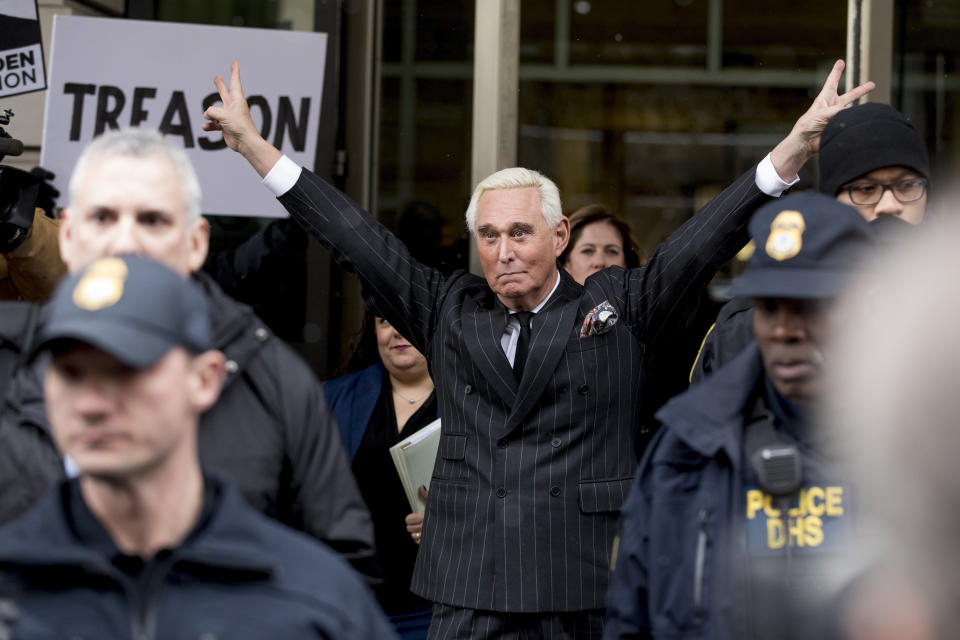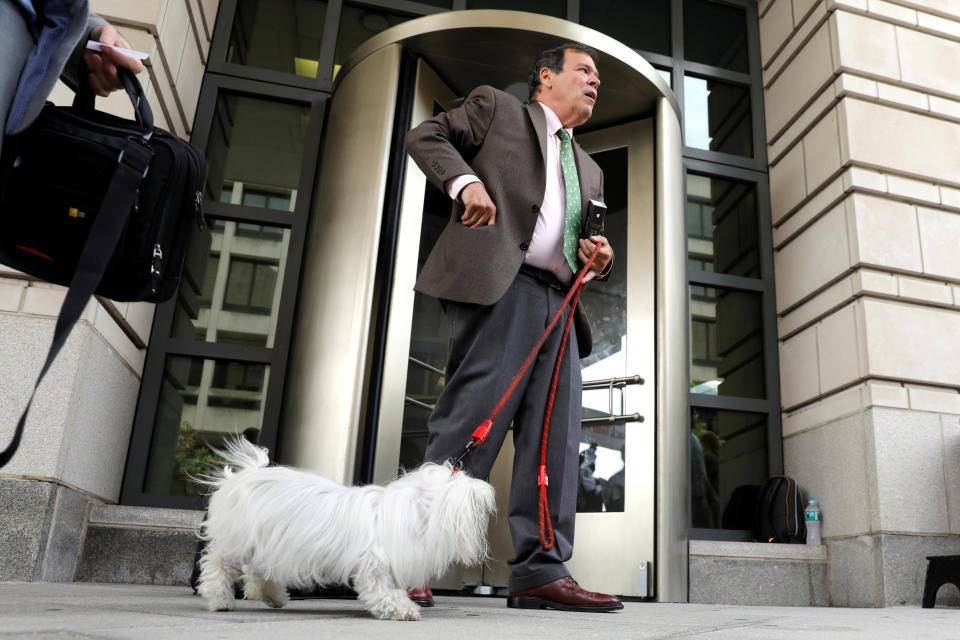Roger Stone's trial could hang on a comedian's drunken texts
- Oops!Something went wrong.Please try again later.
WASHINGTON — It was late in the evening of Oct. 1, 2016, and radio talk show host Randy Credico was at London’s Heathrow Airport doing what he sometimes did in those days: getting smashed. He ducked into a duty-free shop and stocked up on bottles of bourbon and Havana Club rum. He downed shots at the shop’s bar stand. Then, while aboard his flight back to New York and, as Credico recalls it “totally whacked,” he fired off some fateful texts to an improbable confederate: Roger Stone.
The text messages purported to be inside dope on the plans of one of Credico’s heroes, Julian Assange, to release damaging emails that could shake up the U.S. presidential election. They read: “big news Wednesday…now pretend u don’t know me...Hillary’s campaign will die this week.”
Those text messages are likely to be key exhibits in a U.S. courtroom in Washington, D.C., when Stone, the flamboyant longtime political adviser to Donald Trump, goes on trial starting today on charges of obstruction, lying to Congress and witness tampering.

As the one trial to grow out of special counsel Robert Mueller’s investigation that directly relates to the events of 2016, the proceedings promise to be a wild Washington drama with testimony from former Trump campaign chairman Steve Bannon, former deputy campaign manager Rick Gates, and possibly others from the president’s orbit. It also could shed light on one of the biggest mysteries of that year’s campaign: exactly what did Stone, and his allies in the Trump campaign, know about the avalanche of emails hacked by Russian intelligence from the Gmail account of Clinton campaign chairman John Podesta that Assange started releasing just one week after those text messages from Credico.
It is central to the prosecutors’ case that, in 2017, Stone lied to Congress — and obstructed a House Intelligence Committee investigation into the Russia scandal — when he claimed that he had a backchannel “intermediary” to Assange, who tipped him off to what WikiLeaks had in store to torment the Clinton campaign. Stone at first identified his secret source as an unidentified “journalist.” He then later fingered that source to the committee as Credico, a comedian, impressionist and political activist who hosted a talk show on a left-wing New York radio station. Credico, in turn, denied Stone’s claims, calling them “ridiculous” and insisting that he knew nothing about what Assange planned to release.
But Credico’s text messages could give Stone’s lawyers material to chip away at the prosecutor’s case. Those messages “are a bad fact for the government,” said Sol Wisenberg, a criminal defense lawyer who once served as a prosecutor on independent counsel Ken Starr’s staff. “It indicates that [Credico] had — or pretended to have — news that he was giving to Stone.”
To be sure, the existence of the Credico texts are a double-edged sword for Stone’s lawyers. Stone is also charged with lying to Congress when he denied having any emails or texts about his efforts to find out what WikiLeaks had — including any communications he had with Credico.
Still, the text messages will put the spotlight on Credico, a potentially crucial witness who is expected to take the stand later this week. Prosecutors, Yahoo News has learned, have spent hours prepping him and going over every aspect of his unlikely, up-and-down relationship with Stone.
It is a partnership of pranksters that has puzzled friends of both men for years. Stone is a notorious Republican operative who first got attention for his undercover hijinks for Richard Nixon’s 1972 reelection campaign and later worked as a lobbying partner of Paul Manafort, earning him a 1996 cover story in the New Republic under the headline, “The State of the Art Washington Sleazeball.”

Credico couldn’t be more different. An avowed left-leaning comedian, he once appeared on Johnny Carson’s “Tonight Show” doing a dead-on impression of Ronald Reagan. He lionized and worked closely with radical lawyer William Kuntsler, defender of Weathermen, Black Panthers and other self-proclaimed revolutionaries.
Still, the two men bonded over a common cause: repeal of New York’s so-called Rockefeller drug laws, named for the state’s former Gov. Nelson Rockefeller, which imposed draconian prison sentences for minor drug offenses. Stone and Credico glommed onto the 2002 gubernatorial campaign of an eccentric billionaire independent candidate, Tom Golisano, who vowed to repeal the drug laws. The two gadflies made commercials together and later plotted anti-drug law strategy with Credico enlisting Al Sharpton to work with the two of them.
They had their rifts over the years. In 2007, Stone was caught making a harassing, late-night phone call to the ailing father of then New York Gov. Eliot Spitzer, threatening to reveal improper business loans. Faced with losing a lucrative contract as a consultant with Republican state senators, Stone blamed Credico for the phone call, claiming — falsely, according to Credico — that it was actually the comedian who called Spitzer’s father, imitating his voice. It was, Credico would later say, the first instance in which Stone tried to make him his “fall guy.”
But their temporary rupture at that time was nothing compared to the events that unfolded during the 2016 election. Starting that summer, Stone began making claims about his knowledge of political dynamite that Assange was set to unleash about Hillary Clinton. “I actually have communicated with Assange,” Stone told a Florida Republican group on Aug. 8, 2016. “I believe the next tranche of his documents pertain to the Clinton Foundation, but there’s no telling what the October Surprise may be.”
He then followed up with a widely noticed tweet on Aug. 21. “Trust me, it will soon [be] Podesta’s time in the barrel,” it read.

All this got the attention of top Trump campaign operatives who according to newly released FBI documents from Mueller’s investigation, were desperate to find out what Assange actually had (and cared little that it might have originated with a Russian government operation). Trump himself took a phone call from someone whose name was redacted, telling him that “additional leaks” were coming, according to a report of an FBI interview with Gates, his former deputy campaign manager. A top Trump campaign official — widely believed to be Bannon — was directed to contact Stone to find out what he knew, according to Mueller’s indictment of Stone.
It is still not clear that Stone knew much of anything beyond some cryptic comments that Assange had himself made in June about incriminating material he had on Hillary Clinton. In late July, Stone contacted fellow conspiracy theorist Jerome Corsi and asked him to “get to” Assange at the Ecuadorian Embassy. (Corsi emailed back that “word is friend in embassy plans 2 more dumps” but he later denied he had any inside knowledge and was never charged by Mueller.) And Stone began making references to another “intermediary” who was a “mutual friend” of Assange and was telling him about WikiLeaks’ plans.
That “mutual friend” was Credico. And Stone could well have had reason to think Credico was plugged in. On Aug. 25, the WikiLeaks founder gave an interview Credico’s radio show via phone from London. Although Assange revealed nothing about WikiLeaks’ plans, Credico two days later sent Stone a text message: Assange “has kryptonite on Hillary.”
And then came those texts from the inebriated Credico on his flight back from London, the ones that claimed “Hillary’s campaign will die this week.” Credico in fact had tried to see Assange during his London trip but never made it into the Ecuadorian Embassy. (He was photographed standing outside.)

If he knew nothing about what Assange was up to, why did he send Stone those texts? “I don’t know why I put that out there,” Credico said in an interview with Yahoo News’ “Skullduggery” podcast last December. “Assange had been teasing he was doing something in the first week of October and it was unlucky for me to send that to [Stone], joking with him.”
Credico’s “joke” didn’t end there. The next day, Stone texted him “WTF?” after he read an article claiming that WikiLeaks was cancelling a “highly anticipated” announcement for that Tuesday “due to security concerns.” Credico fired back, confidently: “head fake.”
All this was enough for Stone to start alerting his friends in Trump world that something big was coming. “Spoke to my friend in London last night. The payload is still coming,” he wrote on Oct. 3 to a Trump supporter who was active in the campaign. And the next day, a top Trump campaign official got in touch asking about what WikiLeaks was about to unload. WikiLeaks, Stone wrote back, would soon release “a load every week going forward.”
It was a prescient message: On Oct. 7, less than an hour after the release of the “Access Hollywood” tape, WikiLeaks began dumping the Podesta emails — with embarrassing details about the Clinton Foundation and other matters — and continued the releases for the rest of the campaign.
But Credico’s prank — if that indeed what it was — began to get distinctly unfunny a year later when the House Intelligence Committee began pursuing him to see if he would back up Stone’s story that he was his WikiLeaks backchannel. Stone gave Credico what was for him classic advice: “Stonewall it. Plead the fifth. Anything to save the plan…Richard Nixon,” he texted him on Nov. 19, 2017.
On Dec. 1, 2017, Stone told him to do a “Frank Pentangeli” — a Mafia character in “The Godfather II” who testified before a Senate committee and denied what he had previously told the FBI. (Prosecutors want to show a clip of the movie at Stone’s trial, but U.S. Judge Amy Berman Jackson denied the request, saying they can show the jury a transcript instead.)
At that point in the story, this reporter plays a minor role. In late 2017 and early 2018, as I was finishing up “Russian Roulette,” a book about the Russia scandal that I co-authored with David Corn, I tracked down Credico after learning that Stone was claiming the comedian was his backchannel. After several nights of drinks at his favorite downtown New York oyster bar, he agreed to go on the record and told me he knew nothing about what Assange was planning and therefore couldn’t have been Stone’s intermediary. When I went back to Stone for comment as the book was nearing publication, the GOP operative was enraged and began sending threatening text messages to Credico, implying that things could get ugly for the comedian and his beloved service dog, Bianca. “You are a rat. A stoolie. You backstab your friends-run your mouth my lawyers are dying Rip you to shreds,” Stone wrote. And then, Stone wrote, he would “take that dog away from” him and “prepare to die [expletive].”
Those texts earned Stone an extra count in Mueller’s indictment for witness tampering. They also helped earn Credico his trip to the witness stand this week where his testimony could ultimately determine the fate of his erstwhile friend.
Download or subscribe on iTunes: “Skullduggery” from Yahoo News
Read more from Yahoo News:



